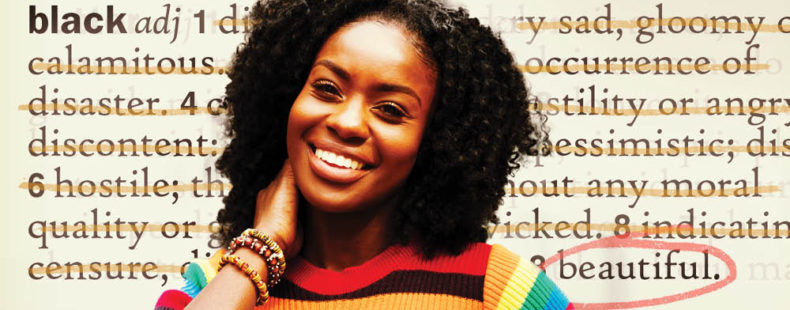Update: Dictionary.com lexicographers have completed updates of our current entry for the word Black. Read on to find out why we’ve decided to revise this particular entry. At Dictionary.com we take words very seriously. They are foundational to how individuals think about themselves, and they can influence the perceptions of others.
When it comes to the language of identity, the words we use are especially important. This is why when My Black Is Beautiful reached out to Dictionary.com about “Redefine Black,” we saw an opportunity to revisit our current entry of the word Black. As a result of this conversation, we are making some updates and revisions that will be rolled out on Dictionary.com later this year.
What changes will we make to our current definition?
If you look on Dictionary.com today, the adjectival sense of Black that refers to people is the third sense on the page. Currently this definition sits right above a definition that reads “soiled or stained with dirt.” While there are no semantic links between these two senses, their proximity on the page can be harmful. It can lead to unconscious associations between this word of identity and a negative term. These are not associations we want anyone to get from Dictionary.com, and so we will be swapping our second and third senses on the page.
Another change we are making is that we will be capitalizing Black throughout the entry when it is used in reference to people. Why
capitalize Black in this context? It is considered a mark of respect, recognition, and pride. This is common practice for many other terms used to describe a culture or ethnicity. Not capitalizing Black in this context can be seen as dismissive, disrespectful, and dehumanizing.
We will also be doing a full review of our usage note about Black.
How are dictionaries made?
Since we’re on the subject of definitions and dictionaries, why not share a little information about how dictionaries are actually made.
The work of lexicography is descriptive, which means that lexicographers look at how language is actually being used and we document that usage. However, language is constantly changing and evolving. This means that the work of a lexicographer is never done and that editing a dictionary is an ongoing project.
There are over a quarter of a million entries on Dictionary.com that our small team of lexicographers is constantly working to update. There is far more work for us to do than we have the time to tackle. The evolving nature of language coupled with our limited resources means that sometimes you might come across something on Dictionary.com that might seem odd, out of date, or offensive.
This is why we are happy to hear from our users, like the My Black Is Beautiful team, if they come across something that requires revision.














